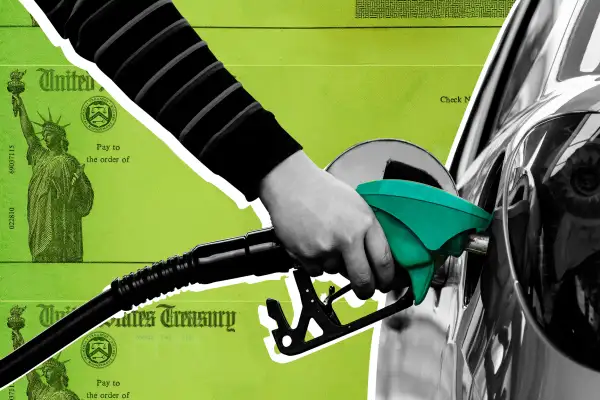Stimulus Checks for High Gas Prices: Yes, It Might Happen

The government wants to give you money to pay for gas.
Gas prices steadily crept up month after month in 2021, and they've soared to historic highs since Russia's invasion of Ukraine. Now, lawmakers want to help families cope with rising costs by pausing gas taxes or simply sending out cash.
While the proposed payments are not officially being called stimulus checks, many recipients would view them in essentially the same way. It would be money paid out by individual states or the federal government to provide relief to those eligible.
In this case, the relief is needed due to high gas prices. Nationally, gas prices are averaging about $4.24, according to data from AAA. Prices are just under the record high, and their recent spike — from $3.53 per gallon on February 21 to $4.32 on March 14 — was the fastest ever recorded in a three-week span, the U.S. Energy Information Administration said Wednesday.
Lawmakers have floated new solutions to help cushion the blow. A bill proposed last week by three Democrats would send money every month to families when the national average for regular gas is more than $4 per gallon. Under the legislation proposed by Reps. Mike Thompson (D-Calif.), John Larson (D-Conn.) and Lauren Underwood (D-Illinois), eligible families below certain income thresholds ($150,000 for joint filers and $75,000 for single filers, just like the requirements for stimulus checks) would receive $100 per month, plus another $100 for each dependent.
The bill, called the Gas Rebate Act of 2022, refers to the money as "energy rebates" and "Economic Impact Payments." The latter is the official term for stimulus checks used by the IRS.
Some states are trying to give money to help residents pay for sky-high gas bills as well. Maine Governor Janet Mills recently revised the amount she wants to send to Mainers from $750 to $850 to account for inflation and rising oil and gas prices.
On Wednesday, California Governor Gavin Newsom floated an $11 billion relief package that would send payments of $400 per vehicle (capped at two vehicles) to families in his state via prepaid debit card. The state would use vehicle registration records to determine who’s eligible, and there would be no income cap “in order to include all Californians who are facing higher prices due to the cost of oil.”
The average price of a gallon of gas in California is $5.88 as of Thursday, according to data from AAA. In Los Angeles, average prices surpassed $6 per gallon this week — a first for any major U.S. city. In a press release, the Newsom administration estimated that the first payments could go out as soon as July if the package is approved by the California Legislature.
Lawmakers target big oil companies
Other lawmakers are targeting big oil companies like Shell and ExxonMobil, which have been criticized in recent weeks for keeping gas prices high even as crude oil prices were falling.
One proposal, from Rep. Ro Khanna (D-Calif.) and Sen. Sheldon Whitehouse (D-R.I.), would use money from a new tax on oil and gas companies to send direct payments to Americans each quarter. The amount of the rebate would depend on the difference between the current price of a barrel of oil and the average price between 2015 and 2019. This rebate would be subject to income restrictions, and the lawmakers estimate that if oil prices were roughly $120 per barrel (as they periodically have been lately), single filers could receive payments up to $240 and joint filers would max out at about $360 over the course of a year.
Another proposal targeting oil company profits has also been floated by Rep. Peter DeFazio (D-Oregon). Money from the new tax would be given to eligible Americans in the form of a monthly rebate.
States are pausing gas taxes, too
Meanwhile, legislators from nearly a dozen states including Maryland, Connecticut, Florida, and Georgia have proposed or already approved gas tax holidays, which would allow gas stations to temporarily stop collecting gas taxes and help lower prices — at least a little. Gas taxes varies by state, from roughly 15 cents per gallon in Alaska to 68 cents per gallon in California. Maryland and Georgia are among the states that have already enacted those holidays.
“This is, of course, not a cure-all, and market instability will continue to lead to fluctuations in prices," Maryland Governor Larry Hogan tweeted last week, “but we will continue to use every tool at our disposal to provide relief for Marylanders.”
Another six Democratic governors have publicly supported a bill from two U.S. Senators that would suspend the federal gas tax (which amounts to another 18 cents per gallon at the pump) until next year.
Will gas prices ever come down?
It’s hard to say whether gas prices are headed back to normal any time soon, especially since demand for fuel is still so strong.
For now, all of the direct payment proposals for high gas prices are just that — proposals. None have been signed into law, and it remains to be seen whether that will happen.
Given that 2022 is an election year and the price of gas is an increasingly hot-button issue across the United States, it'd be no surprise if lawmakers were especially motivated to pass legislation that will undoubtedly be popular with voters.
If you’re looking for ways to save money on gas in the meantime, consider paying with cash or opening a gas rewards card or grocery store rewards program account.
More from Money:
Your State Taxes on Groceries, Income, Gas and More Could Soon Be Slashed
